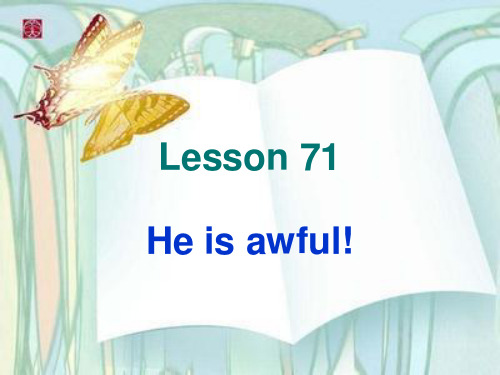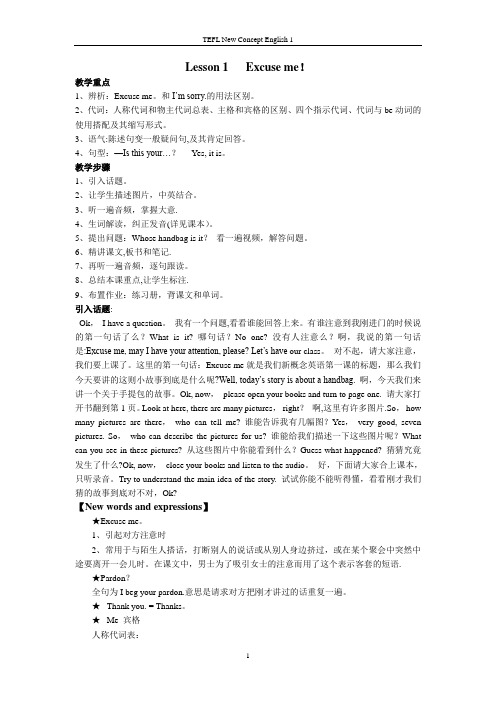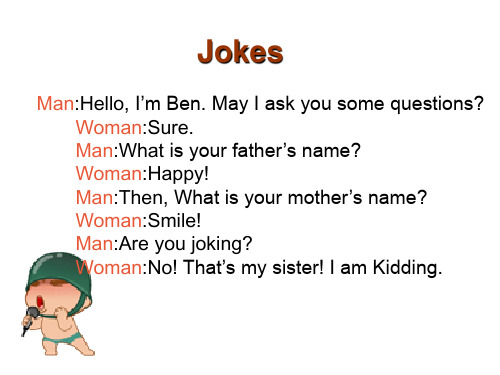新概念第L71课-He-is-awful-教案教学文稿
新概念英语第一册117课课件

Words and expressions
The text includes a variety of useful vocabulary and expressions related to learning English.
04
reading comprehension
Reading materials
Text
"The Olympic Games"
Background information
The history and development of the Olympic Games, the significance of the Games in modern society, and the role of the Olympics in promoting global peace and friendship.
Some examples of words and expressions are: "global language," "interconnected world," "essential," "communication," "learning curve," "fluency," "conversational skills."
01
Sorting out the content of the text
Topic of the text
The topic of the text is about the importance of learning English.
新概念英语第一册第71-72课He’sawful内容讲解

新概念英语第一册第71-72课He’sawful内容讲解新概念英语第一册第71-72课He’s awful内容讲解导语:大家应该都有过讨厌别人或被别人讨厌的时候,下面是一篇关于这方面的英语课文,欢迎阅读。
Lesson 71 He's awful!他讨厌透了!Listen to the tape then answer this question.How did Pauline answer the telephone at nine o'clock?听录音,然后回答问题。
波淋在9点接电话时是如何说的?Jane : What’s Ron Marston like , Pauline ?简:罗恩.马斯顿是怎样一个人?Pauline : He’s awful ! He telephoned me four times yesterday , and three times the day before yesterday.波淋:他讨厌透了!他昨天给我打了4次电话前天打了3次。
Pauline: He telephoned the office yesterday morning and yesterday afternoon. My boss answered the telephone .波淋:他昨天上午和下午把电话打到了我的办公室,是我的老板接的。
Jane : What did your boss say to him ?简:你老板是怎么对他说的?Pauline: He said ,”Pauline is typing letters .She can’t speak to you now !”波淋:他说:“波淋正在打信,她现在不能同你讲话!”Pauline : Then I arrived home at six o’clock yesterday evening .He telephoned again .But I didn’t answer the phone !波淋:后来,我昨晚6点钟回到家里。
新概念英语第一册第71-72课-He’s awful

新概念英语第一册第71-72课:He’s awfulLesson 71 He's awful!他讨厌透了! Listen to the tape then answer this question.How did Pauline answer the telephone at nine o'clock?听录音,然后回答问题。
波淋在9点接电话时是如何说的?Jane : What’s Ron Marston like , Pauline ?简:罗恩.马斯顿是怎样一个人?Pauline : He’s awful ! He telephoned me four times yesterday , and three times the day before yesterday.波淋:他讨厌透了!他昨天给我打了4次电话前天打了3次。
Pauline: He telephoned the office yesterday morning and yesterday afternoon. My boss answered the telephone .波淋:他昨天上午和下午把电话打到了我的办公室,是我的老板接的。
Jane : What did your boss say to him ?简:你老板是怎么对他说的?Pauline: He said ,”Pauline is typing letters .She can’t speak to you now !”波淋:他说:“波淋正在打信,她现在不能同你讲话!”Pauline : Then I arrived home at six o’clock yesterday evening .He telephoned again .But I didn’t answer the phone !波淋:后来,我昨晚6点钟回到家里。
他又打来电话,但我没接。
Jane : Did he telephone again last night ?简:他昨夜里又打电话了吗?Pauline : Yes , he did . He telephoned at nine o’clock .波淋:是的,打了。
新概念一册lesson 71He is awful

Lesson 71 He is awful!
单词学习
• • • • • • • • awful telephone time answer last phone again say (said) adj. 让人讨厌的,坏的 v. & n. 打电话;电话 n. 次(数) v. 接(电话) adj. 最后的,前一次的 n. 电话(=telephone) adv. 又一次地 v. 说
3.表示已故人所做的事情。
Comrade Lei Feng did good deeds in his life. 雷锋同志做了一生的好事。
4. 表示过去所发生的一系列的动作,而这一系列的 动作是从现在的角度来考虑的,不是从动作相互之 间的关系这一角度来考虑的。
Miss Liu got up at seven o’clock this morning, dressed, had breakfast, and went to work.
needed /’ni:did/
写出下列动词的过去式
1. look 2. live 3. stop 4. go 5. hope 6. trip 7. call 8. eat 9. want 10. are looked lived stopped went hoped tripped called ate wanted were 11. go 12. have 13. do 14.get 15. come 16. say 17.see 18. put 19. read 20.take went has did got came said saw put read took
新概念第一册7172

常用短语:
on time 按时,准时 in time 及时 all the time 一直
at the same time
★answer v. 接(电话)
① v. 对……作出反应;响应 answer the phone/telebell 应声开门 Who answered the telephone?谁接的电话?
He answered the phone yesterday. He didn’t answer the phone yesterday. Did he answer the phone yesterday? When did he answer the phone?
speak to sb. 与某人说话 May I speak to Pauline, please? I’d like to speak to Pauline,
Lesson 71-72
He’s awful
Words:
awful telephone time answer last phone again say (said)
adj. v. & n. n. v. adj. n. dv. v.
让人讨厌的,坏的 打电话;电话 次(数);时间 接(电话);回答 最后的,前一次的 电话(=telephone) 又一次地 说
② v. 回答;答复 answer a letter 回信 answer the question
回答问题 Could you answer my questions?
③ n. 答案;解决办法;答复 This is the answer to this question. Do you know the answer to Question 10?
新概念英语第一册Lesson7172He'sawful小学英语初中英语全国通用

2. — What did she do yesterday morning?
→ boil an egg
boil : v. 把... 烧开
— She boiled an egg yesterday morning.
Language Point
语句讲解、课文讲解
3. — What did they do yesterday? → clean their shoes
下一题
对划线部分提问。 They played a game yesterday afternoon. ___________________________
正确答案: What did they do yesterday afternoon?
查看答案解析
答案:What did they do yesterday afternoon? 解析: 考查特殊疑问句 提问做什么用疑问词what , "yesterday afternoon'' 是一个表示过去的时间状语所以用 一般过去时态 , 助动词do要改为 did; 后面跟动词原形; 译文:他们昨天下午做了什么?他们昨天下午做游戏了。
第三人称: What did she / he / it do yesterday?
复数: What did they do yesterday?
Language Point
语句讲解、课文讲解
1. — What did you do yesterday? → air the room
— I aired the room yesterday. 我昨天给房间通了通风。
He did. = He telephoned. Did he telephone again last night?
Lesson 71-72 He’s awful!新概念一册教师用课件

He’s awful!
•last •phone
•adj. •n. •最后的 telephone •上一次的 的缩写
•again •say
•adv.
•v.说
•再、又一 •said
次
补充单词
•speak •v.说 •spoke
•before •prep. •在..之前
•Ron Marston 朗.马斯顿 Pauline 波林
Open your book to page 143
• Time
1.和今天有关的时间短语
•今天 •today •今天早上 •this (上午) morning
•今天下午 •this afternoon •今天傍晚 •this evening •今天夜里 •tonight
2和昨天有关的时间短
•昨天
语
yesterday
•昨天上午
• yesterday morning
• 昨天傍晚 •yesterday evening • 昨天夜里 •last night • 昨天下午 •yesterday afternoon
3和前天有关的时间短 语
•前天
•the day before yesterday
•前天上午
•empty •emptied •copy •copied •cry •cried
4.‘v.’直接加‘ed’ •look •looked •wash •washed •listen •listened
5.不规则变化
say
said
speak spoke
动词过去式的读音
1.在浊辅音和元音后读
〔d〕如:
•Did he telephone you yesterday? •回答:Yes, sb did.
新概念一第L71-72-课课件

She listened to music yesterday. Did she listen to music yesterday?
He op变en一ed般th疑e b问ox:ye无st情erd无ayb. e提助动 Did he一op般en过th去e b时ox:ye助dstied动r提dda前yid?谓提还句原首。,
JANE: What did you say to him? PAULINE: I said, ‘__T_h_is___ is Pauline's mother.
Please don't telephone my daughter _a_g_a_in__!’
JANE: Did he telephone again? PAULINE: No, _H_e__d_id_n_’t_!
Bell American
telephone cell phone
New Words
aHale Waihona Puke ful ['ɔːfʊl] adj. 让人讨厌的,坏的
telephone ['telɪfəʊn] v. & n. 打电话;电话
time
[taɪm] n. 次(数)
answer ['ɑːnsə] v. 接(电话)
我非常抱歉。 I am awfully (very) sorry.
time n. 次(数)
1. 时间 (不可名) What’s the time? on time 准时 in time 及时
2. 次数(可数名词) 一次: once, 两次: twice, 三次或三次以上:基数词+times three times ten times
新概念第一册教案完整版

Lesson 1 Excuse me!教学重点1、辨析:Excuse me。
和I’m sorry.的用法区别。
2、代词:人称代词和物主代词总表、主格和宾格的区别、四个指示代词、代词与be动词的使用搭配及其缩写形式。
3、语气:陈述句变一般疑问句,及其肯定回答。
4、句型:—Is this your…?-Yes, it is。
教学步骤1、引入话题。
2、让学生描述图片,中英结合。
3、听一遍音频,掌握大意.4、生词解读,纠正发音(详见课本)。
5、提出问题:Whose handbag is it?看一遍视频,解答问题。
6、精讲课文,板书和笔记.7、再听一遍音频,逐句跟读。
8、总结本课重点,让学生标注.9、布置作业:练习册,背课文和单词。
引入话题:Ok,I have a question。
我有一个问题,看看谁能回答上来。
有谁注意到我刚进门的时候说的第一句话了么?What is it? 哪句话?No one? 没有人注意么?啊,我说的第一句话是:Excuse me, may I have your attention, please? Let’s have our class。
对不起,请大家注意,我们要上课了。
这里的第一句话:Excuse me就是我们新概念英语第一课的标题,那么我们今天要讲的这则小故事到底是什么呢?Well, today’s story is about a handbag. 啊,今天我们来讲一个关于手提包的故事。
Ok, now,please open your books and turn to page one. 请大家打开书翻到第1页。
Look at here, there are many pictures,right?啊,这里有许多图片.So,how many pictures are there,who can tell me? 谁能告诉我有几幅图?Yes,very good, seven pictures. So,who can describe the pictures for us? 谁能给我们描述一下这些图片呢?What can you see in these pictures? 从这些图片中你能看到什么?Guess what happened? 猜猜究竟发生了什么?Ok, now,close your books and listen to the audio。
新概念英语第一册第117课课件讲课讲稿

117课 过去进行时练习: 一、仿照例句用所给 的词汇造句。
1. I, see him, he, cross the street I saw hi m while he was crossing the street. (He was crossing the street when I saw him.) A. the sun, shine, we, come out B. she, study at college, the war, break out C. she, work in a factory, the city, be liberate d (放) D. he, lose his pen, he, go sightseeing in th e city
原创力文档是网络服务平台方若您的权利被侵害侵权客服qq
阅读课文回答问题
What does the she mean by ‘change’ in the last sentence ?
再看一遍课文
When my husband was going into the dining room this morning
本课语法过去进行时
1.过去进行时由“主语+was/were+动词ing”构成 2.过去进行时的否定式由“主语+was/werenot+现 在分词”构成 3.过去进行时的疑问式由“was/were+主语+现在 分词”组成 句型 肯定句=主语+was/were+doing+其它 否定句=主语+was/were+not+doing+其它 一般疑问句问语=Was/Were+主语+doing+其它 答语:Yes,Iwas/were.或No,Iwasn't/were’t. 特殊疑问句=特殊疑问词+一般疑问句+其它
NCE1 L71 72新概念一教案新部编本

教师学科教案[ 20 – 20 学年度第__学期]任教学科:_____________任教年级:_____________任教老师:_____________xx市实验学校New Concept English ITeaching content: L71 72 By: Miss Mo Teaching aims: Date: Oct.14th ,20121.Ss review the use of the Past Simple tense.2.Ss study more on regular verbs' past forms.Teaching methods:1.Audio lingual approach.2.Pair work and group work.petition and role-play method.Teaching procedures:Step One: Warm up1. Greeting.2. Revision--Ss recite Lesson67 69--Check Homework.3. Free talk:WeatherStep Two: Lead in New Lesson and presentation.L71 1. Learn in new words &expressions--Ask Ss to read this words by themselves.--Then T to teach Ss to read.--At last, read together and then check Ss to read.2. Lead in Lesson- T/S look at the pictures on P141, and try to tell why he is awful.3.Presetation--Ss watch the video th en answer this question, “How did Pauline answer the telephone at nine o’clock?”--T/S study the dialogue between Jane and Pauline together, pay attention to the use of the Past Simple tense, especially regular verbs' past forms there.--Ss read the dialogue aloud once.--T/S try to retell the story in their own words.4. Key patternsComprehension1 T: Is Ron Marston nice? S: No, he isn’t.2 T: What’s he like? S: He’s awful.3 T: What did Ron Marston do yesterday? S: He telephoned Pauline four times.$ T: How many times did he telephone the day before yesterday? S: Three times.5 T: When did Ron Marston telephone the office? S: Yesterday morning andyesterday afternoon.6 t: Who answered the telephone? S: Pauline did.7 T: What time did Pauline arrive home yesterday evening? S: At six o’clock.8 T: Did she answer the phone? S: No, she didn’t.9 T: What time did Ron Marston telephone last night? S: At nine o’clock.10 T: Did he telephone you again? S: NO, he didn’t.Step Three: Lead in New Lesson and presentation.L72 1. Learn in new words &expressions--Ask Ss to read this words by themselves.--Then T to teach Ss to read.--At last, read together and then check Ss to read.2. Lead in Lesson--T/S first compare different times on TODAY, YESTERDAY and THE DAY BEFORE YESTERDAY in the box on P143.--T/S then study picture 1~15 on P143 for regular verbs’past forms, pay attention to the pronunciation of “ed”.--T/S do Exercise A on P144 together.--T/S study the example in Exercise B, Ss do Exercise 1~5 with a partner orally.--T/S check the answers.Step Four :Classroom activity: describing words.--Ss take turns and come up to the blackboard to write a word, other Ss try to explain or demonstrate the meaning in English. Let the teacher guess.Step Five: Homework1.Read English at least 20 minutes, recite L712.Copy and recite L71 724times,then have a dictation.3.Reading&Listening.4.Write composition.。
新概念第一册(L71-72)

★ speak “说(某种语言)” speak Chinese 指和某人说话 speak to sb.,
例如: 我会说日语。 I can speak Japanese.
★ tell “告诉” tell sb. sth. = tell sth. to sb. 告诉某人某事 tell sb. about sth. 告诉某人关于某事
awful
The baby feels awful. The weather is awful.
telephone
n.电话 ,电话机
v.打电话
answer
answer the phone/question/letter
time
three times
two times twice one time once
如果幸运,接电话的是你要找的人,对方会说: Yes, speaking.(我就是。)
如果接电话的不是你要找的人,对方会说: He/She‘s not in .(他/她不在。)
等一会儿,别把电话挂断: Wait a minute.
稍等片刻: Hold on a second.
你接了找别人的电话,对要找的人说: A call for you./You are wanted on the phone.
Lesson71 He’s awful!
Listen to the tape and answer this question:
How did Pauline answer the telephone at nine o’clock?
She said, this is Pauline’s mother. Please don’t telephone my daughter again.
新概念英语第一册L71~72

Lesson 71 ~ 72 He’s awful!!词汇详解(1) awful adj. 让人讨厌的,坏的e.g. He is awful. = He is very terrible.派生:awfully = very adv. 非常e.g. I am awfully sorry. = I am very sorry.(2) telephone v./n. 打电话;电话telephone sb. = phone sb.(3) time n. 次(数)time作可数名词:次数;作不可数名词:时间一次:once 两次:twice 三次:three times(4) answer v. 接(电话);回答a. 接电话answer the phoneb. 回答问题answer the question(5) last adj. 最后的,前一次的最后一个the last one 上次last time反义词first 第一个the first one(6) phone n. 电话(= telephone)挂电话rise off the phone = hang up the phone(7) again adv. 又一次地again 往往可以表示词缀:re-read it again= reread play it again= replay(8) say v. 说( say – said – said )区别:say、tell、speak①say 往往后面就跟说的内容或对象,如say sth. to sb.自言自语say to oneself② tell 往往具有告知的含义,如 tell sb. to do sth.说谎tell a lie 讲故事tell a story③ speak 后面往往是跟语言或人如speak to sb. 意为“与某人说话”,常用于打电话时e.g. 请让玛丽接电话好吗? May I speak to Mary, please?! 重点语法一般过去时II(1) be 动词的过去式有两种形式:was 和were (请参见 Lessons 67-68语法部分)(2) 实意动词的过去式变化形式可分为:规则变化和不规则变化" 规则变化,其规则如下:a. 一般情况加-ed :look →looked watch →watchedb. 以不发音的e 结尾的加-d :smile →smiled like →likedc. 以辅音字母+y 结尾,变y 为i 再加-ed :hurry →hurried carry →carriedd. 以一个辅音字母结尾的重读闭音节词,双写字尾加-ed :pat →patted" 另一部分动词的过去式拼写不规则,因此称为不规则动词,需牢记:go →went get →got have →had say →said do →did(3) 用一般过去时的句子中常常有表示过去某一时刻的时间状语,如: 昨天 yesterday 昨夜 last night前天the day before yesterday昨天上午 yesterday morning# 试一试:。
新概念一册L71-72

swer
v. 接(电话)
① v. 对……作出反应;响应 answer the phone/telephone 接电话 answer the door/doorbell 应声开门 ② v. 回答;答复 answer a letter 回信 I don’t think you’ve answered my question. 我认为你没有回答我的问题。 ③ n. 答案;解决办法;答复 I wrote him several letters but I couldn’t get an answer. 我给他写了好几封信,可都没有回音。
一般动词过去时的句型结构
1.肯定句 主语+动词的过去式~
我昨天去上学了。 I went to school yesterday.
2. 否定句 主语+didn’t+ 动词原形~ 我昨天没有去上学。 I didn’t go to school yesterday.
3. 疑问句 Did +主语+ 动词原形~ ?
动词过去式变化规则 a.规则动词的变化
1.一般在动词末尾加-ed
air clean
opened sharpened
open sharpen called looked
turn listen talk watch
aired cleaned turned listened
talked watched
What did she do this evening ? She turned on TV.
课堂小练习:
1、Anna, dinner is ready. Where's Peter? He ( )his homework in his room. A does B did C is doing D will do 2、( ) are the two girls doing in the classroom. A Who B W hat C Where D when 3、Lucy is talking( )Tom ( )the sports meeting. A to; about B about; to C with; to D to; with
- 1、下载文档前请自行甄别文档内容的完整性,平台不提供额外的编辑、内容补充、找答案等附加服务。
- 2、"仅部分预览"的文档,不可在线预览部分如存在完整性等问题,可反馈申请退款(可完整预览的文档不适用该条件!)。
- 3、如文档侵犯您的权益,请联系客服反馈,我们会尽快为您处理(人工客服工作时间:9:00-18:30)。
6readthe texttogether
7.Chineseand English. (fast reaction)
8. underline the past tense sentences
课间:老师检查学生材料---作业本,家校沟通本,做好记录
3.practice the question:point and say(区分不同主语,操练主语)
3. pair work:make sentence according to the picture.
4. conclusion:询问某人过去做了什么的句型,
根据一版回答的句子总结一般过去时的结构,定义,时间标志
1)T ask SS Task 1S
2)组织用语Hello ,boys and girls How are you?today…
Step2 Review 5
L69-70words
1 fast reaction
2 SS----1S(由全班到个人)
组织用语:GA and GB have a match I say结束you sayfinishand spellitOK
3看音标说单词并且spell it
Words拓展
接电话:answer the phone/ telephone
Text-------
1lead in(图片)
组织用语:
T: Look, this is Pauline, and this is Jane. What are they talking about?Listen to the tape and answer the
3 L71语法理解及掌握一般过去时及动词过去式规则变化
句型结构:
由Ss通过观察和会意,总结句型结构,并完成句型转换口头练习和笔头练习。
Ⅳ.Difficult points:
L71语法理解及掌握一般过去时及动词过去式规则变化
Ⅴ. Teaching aids:
1 radio;2PPT
Ⅵ. Teaching periods: 3 lessons
Ⅶ. Teaching steps:
课前1.上交作业本,互动手册
2.同学找老师背词
3.读书(老师批改作业)。
4.点名
The First Lesson
Step1 Warm up and Greeting 5
1Greeting(Hello. Nice to meet you. How are you? What's the weather like? What are you going to do tomorrow?Where were you yesterday?What was in my hand just now?)
新三L71-72电子教案
课型指:新课、活动课或复习课
授课教师
授课时间
班级代号
NC1
授课地点
课型
新课
课时
3节课
课题
L71He’s awful
教学设计
过程反思
Ⅰ.Teaching content:L71words text Grammer
Ⅱ. Teaching aims :
1 L71单词听说读写及单词拓展
How many cars were there in the race?
Who was the winner?
2Check the answer.
3Listen to the tape again andanswermy question (每两三句提一两个问题,答对加分)
4. Listen to the tape and follow the tape again. (one sentence by sentence)洋腔洋调模仿(一遍)并且请S翻译句子(listen and translate the sentence one sentence by sentence,)
5.动词过去式规则变化规律总结
6.笔头练习动词过去式变化
7.一般过去时句型的转换T示范
8.口头练习2组
9.笔头练习2组
L73,74words
1引导拼读+带读模仿
组织用语:(拼读单词先要找到元音,划分音节,辅元进行相拼。Let’s read it)
L69Text
1Ss根据中文背诵课文
组织用语:Let’s recite the text together according to theChinesemeaning.
L69-70Grammar
1方位介词短语。
组织用语:Isay在桌子上,you sayon the desk,OK?
2.Pair work(根据图片回答)
Sentence andGrammar
1lead in:用自己的timetable导入,Igot up at half past seven.I …
What did you do yesterday?引导学生注意play等常用动词的变化
2.practice the answer:ask and answer组到个人
2 L71课文理解及读背,重点句型
3 L71语法理解及掌握(一般过去时及动词过去式规则变化)
4完成相关练习
Ⅲ.Main points:
1 L71单词听说读写----分解拼读,接龙,快速反应
拓展----出示句型让孩子理解意思,中英文互译,学生在老师引导下造句。快速反应。
2 L71课文理解及读背---口语问答,翻译,重难点句子突破,造句,中英文记忆
A:What was on the desk just now?
B:There was/were…
Step3 presentation30
L71-72Words
1引导拼读+带读模仿
组织用语:(拼读单词先要找到元音,划分音节,辅元进行相拼。Let’s read it)
2中英互译
组织用语(if Isay次数you saytimeand spell it)
The Second Lesson
Step1.小测10
Step2.Revision: 5
1. review the words (fast reaction)
2. review the sentence: make sentence according to the key words.
Step3.presentation:25
